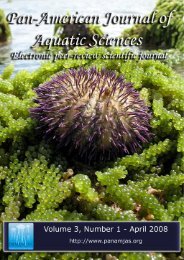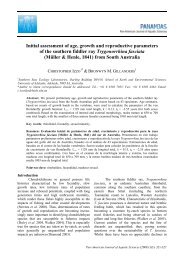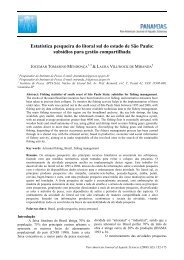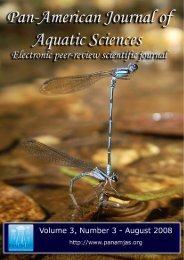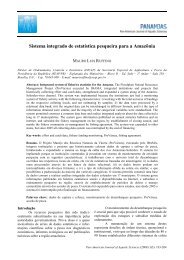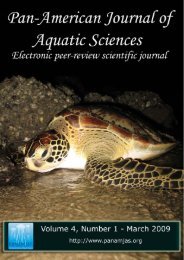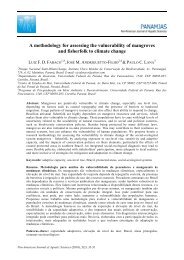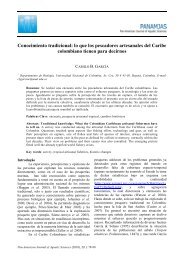Download full issue - PanamJAS
Download full issue - PanamJAS
Download full issue - PanamJAS
- No tags were found...
Create successful ePaper yourself
Turn your PDF publications into a flip-book with our unique Google optimized e-Paper software.
Climate Change and Brazilian Coastal ZoneVa comparison of present and past data allow DeFaveri et al. to find important changes in anintertidal macroalgal community in southern Brazil(Santa Catarina State). The results include theappearance of tropical and opportunist species notpreviously described in this region, and thedisappearance of local common taxa that used tooccur in the 70´s decade. Many marine populationresponses to temperature increases are expected tobe pronounced or to be initially detected intransitional warm-temperate regions, such asSouthern Brazilian region. On rock shores, however,climate change may not lead to a simple polewardshift in the distribution of intertidal organisms butmay cause localized extinctions, due to the inabilityof species to move into suitable habitats (Hawkins etal. 2008).Therefore, monitoring marine populations,with a focus on stenothermic species, can provideuseful indicators of climate change effects,particularly where historical temperature data are notavailable.The contributions appearing in the presentvolume deal mainly with climate variability and itspotential impacts during the previous decades or thepast century. In contrast, Medeanic & Correa gofurther back through recent geological time. Basedon radiocarbon and palynomorphic data from cores,these authors make a preliminary paleoreconstructionof climate, sea-level oscillation andenvironmental changes in the coastal plain of thesouthernmost state of Brazil during the Holocene(~10,000 B.P.). Their work highlights the potentialof palynomorph proxies as a tool to predict futurescenarios based on climatic change periodicity.The crucial role of scientific communicationand media coverage on the GCC <strong>issue</strong> is alsoconsidered in this volume. Hellebrandt &Hellebrandt review the coverage of GCC by theBrazilian media and identified critical points.Among these points is the predominance of <strong>issue</strong>sset by an international scientific and politicalagenda. The Brazilian media reproduces informationprovided by international agencies and news sourcesconnected with this agenda, which overlooks bothlocal reality and scientific expertise. Failure tocommunicate key messages about climate change,particularly if the regional context is not considered,can have negative implications for public awarenessand for establishing climate change policies.Final remarksIf the physics of climate change stillinvolves many uncertainties, the impacts of climatechange on coastal and marine ecosystems are stillvery much controversial, particularly in the case ofanalysis at the regional level. It seems relatively lesscomplicated to predict the effects of a changingparameter (e.g., rising temperature, acidification anddecreasing light) on isolated species from previousknowledge about their physiology, ecology andreproductive biology. However, many challengesarise when predicting the responses at thecommunity and ecosystem level, in addition to thecomplexity added by synergistic effects (Walther etal. 2002, Williams et al. 2008, Russel et al. 2009,Hoegh-Guldberg & Bruno 2010). Therefore, thechallenge posed to the worldwide scientificcommunity working with GCC and its impacts isparamount and will demand the best of our talentand creativity.The papers presented in this Special Issueconstitute a first step towards the provision ofguidance to managers and policymakers who mustaddress the impacts of GCC in the Brazilian coastalzone, particularly in relation to the Climate ChangeNational Plan. However, a series of scientific goalsstill need to be achieved to evaluate the effects ofclimate change on the Brazilian coastal zone. Thesegoals include the analysis and integration ofhistorical data, the application of standardisedprotocols, hypothesis testing, and continuous dataacquisition programmes specifically designed toobserve the coastal environments.For most Brazilian coastal ecosystems andregions, temporal and large spatial data is scarce forboth biotic and abiotic parameters. Where available,information is isolated, punctual in space, with shortand incomplete time series (if any). Most studiesalso lack integrated or comparative protocolconsistency. Scientific evaluations and futureplanning on the impacts of climate change alongBrazilian coastal zone will achieve development ifobservational systems are implemented andimproved to allow systematic monitoring programsof physical, chemical, biological and socialparameters. Experimental approaches can helpclimate change science and management, but onlyafter a better determination of questions andhypothesis, that are specific to each regionalcondition.By researching GCC, science and scientistscannot be apart from society. Public awareness andeducation may affect, at middle and long term,society opinion, behaviour and political decisions,contributing for the advance of climate changepolicies and actions. The Rio Grande Declaration,an open letter released soon after the Workshop andnow officially published in this volume, constitutes apreliminary attempt of CZ members and meetingparticipants to contribute to awareness and influencePan-American Pan-American Journal of Aquatic Sciences (2010), 5(2): I-VIII



